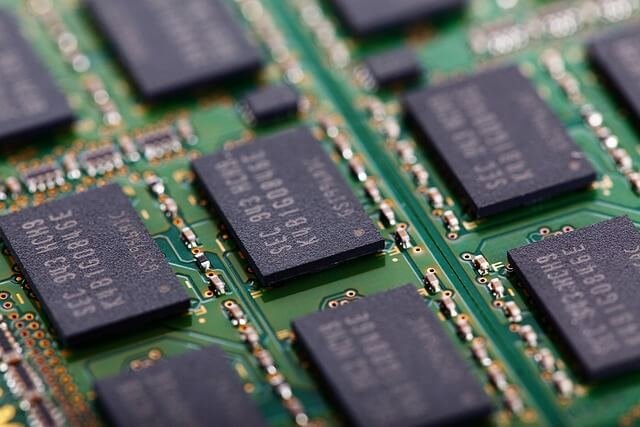In the tech industry, competition is fierce, and when it comes to computer chips, there are some big players dominating the market. However, that doesn’t mean there aren’t smaller companies out there making waves and giving these tech giants a run for their money. In this blog post, we’ll be taking a closer look at 10 computer chip companies that are currently competing with the biggest names in tech. From innovative startups to established brands reinventing themselves, you won’t want to miss this roundup of game-changers in the world of computer chips.
Nvidia
Nvidia is a computer chip company that designs and manufactures graphics processing units (GPUs) for the gaming and professional markets, as well as system on a chip units (SoCs) for the mobile computing and automotive markets. The company has been in operation since 1993 and its headquartered in Santa Clara, California.
Nvidia’s GPUs are used in a variety of gaming consoles, including the PlayStation 4, Xbox One, and Nintendo Switch. The company has also partnered with Microsoft to provide GPUs for the Xbox Series X and Series S consoles. In the professional market, Nvidia’s GPUs are used in workstations and servers for applications such as video editing, 3D rendering, and machine learning.
The company’s SoCs are used in a range of mobile devices, including smartphones, tablets, laptops, and automotive infotainment systems. Nvidia’s Tegra processor is one of the most popular mobile SoCs on the market. The company has also developed the Drive PX platform for autonomous vehicles.

AMD
Advanced Micro Devices, Inc. (AMD) is an American multinational semiconductor company based in Santa Clara, California that develops computer processors and related technologies for business and consumer markets. Its main products include microprocessors, motherboard chipsets, embedded processors and graphics processors for servers, workstations and personal computers, and embedded systems applications.
In the past few years, AMD has been gaining market share from its larger competitor Intel. In the second quarter of 2018, AMD held a 14% share of the central processing unit (CPU) market compared to Intel’s 82%. This marks the first time since the fourth quarter of 2013 that AMD has had more than a 10% share of the total CPU market.
Qualcomm
Qualcomm is one of the world’s leading mobile chip companies and is currently in a battle with Apple over patent infringement. Qualcomm has also been working on chips for self-driving cars and has partnerships with major automakers. The company is also expanding into the IoT market with its Qualcomm Halo chips.
Xilinx
As one of the world’s leading providers of All Programmable FPGAs, SoCs and 3D ICs, Xilinx offers the most scalable and adaptable processing technology for systems that are constantly changing. This gives them a big advantage over traditional chip companies who have to design and manufacture new chips to keep up with the latest changes in technology.
Xilinx’s products are used in a wide range of applications, from consumer electronics and industrial automation to aerospace and defense. They have a strong focus on energy-efficient solutions, which is why their products are often used in green technology applications.
Xilinx is a publicly traded company with a market capitalization of over $20 billion. They have been in business for over 40 years and have a strong financial position. Their research and development expenses were over $1 billion last year, which shows their commitment to innovation.

Intel
Intel is the world’s largest semiconductor chip maker, based on revenue and market share. The company’s chips are used in a wide range of computing and communications products, including PCs, servers, smartphones, and autonomous vehicles. Intel has a long history of innovation, dating back to the development of the microprocessor in 1971. Today, the company is focused on delivering ” Moore’s Law ” – doubling the number of transistors on a chip every two years – through continued investment in research and development (R&D).
Intel’s R&D budget was $13 billion in 2016, up from $12.6 billion in 2015. The company plans to increase its R&D spending to $20 billion by 2020. This increased investment is aimed at driving down the cost of making chips while also improving their performance. In addition to traditional silicon-based chips, Intel is also investing in alternative technologies such as photonics and quantum computing .
The company has been facing increased competition from rivals such as AMD , Qualcomm , and Samsung . These companies have been able to gain market share by offering cheaper or more power-efficient alternatives to Intel’s products. In response, Intel has been working to diversify its product portfolio beyond PC chips. The company has acquired a number of firms that specialize in areas such as artificial intelligence (AI), 5G connectivity , and autonomous driving .
Broadcom
Broadcom is one of the world’s leading suppliers of semiconductor chips, offering a comprehensive portfolio of products that enable customers to develop advanced digital and mixed-signal systems. The company offers a broad range of solutions for wired and wireless communications, enterprise storage, and industrial markets. Broadcom has a strong presence in the datacenter, with its products used in servers, switches, routers, and other networking equipment. The company is also a major supplier of chips for consumer electronics, including TVs, set-top boxes, Blu-ray players, and smartphones.
MediaTek
MediaTek is best known for its mobile processors, which are used in a wide range of smartphones and other devices. The company has been gaining ground in recent years, thanks to its focus on affordable devices. In addition to mobile processors, MediaTek also produces chips for other applications such as TV set-top boxes, Blu-ray players, and automotive systems.

Cirrus Logic
Cirrus Logic is a company that designs, develops, and markets analog and mixed-signal integrated circuits (ICs). The company’s products are used in a variety of electronic devices, including smartphones, tablets, digital cameras, MP3 players, automotive infotainment systems, and industrial control equipment.
Cirrus Logic was founded in 1984 by Michael J. Hackworth and is headquartered in Austin, Texas. The company has over 1,000 employees worldwide.
Cirrus Logic’s product portfolio includes audio codecs, amplifiers and sound processors, mixed-signal processors, power management ICs, data converters, and RF ICs. The company’s products are used in a variety of electronic devices, including smartphones, tablets, digital cameras, MP3 players, automotive infotainment systems , and industrial control equipment.
Cirrus Logic’s mixed-signal processing technology enables it to offer highly integrated solutions that combine analog and digital signal processing functions on a single chip. This allows the company to offer customers smaller form factor solutions with reduced power consumption.
Texas Instruments
Texas Instruments (TI) is a major American electronics company that designs and manufactures semiconductor chips, integrated circuits, and other electronic components. TI is one of the top ten semiconductor companies worldwide, with a market share of 3.6% in 2019. The company’s headquarters are in Dallas, Texas.
TI’s main products include microprocessors, digital signal processors (DSPs), application-specific integrated circuits (ASICs), analog ICs, and embedded processors. The company also manufactures other semiconductor products such as data converters, interface devices, power management ICs, and sensors. TI has numerous manufacturing facilities around the world, including in the United States, China, Europe, and India.
The company’s revenues have been declining in recent years due to competition from larger tech firms such as Intel and Samsung. However, TI remains profitable and is investing heavily in research and development (R&D). In 2019, TI spent $4.8 billion on R&D, which was about 21% of its total revenues. The company’s focus on R&D has helped it to develop new products and stay ahead of the competition.
TI’s strong R&D capabilities have enabled it to maintain a leading position in the analog IC market. Analog ICs are used in a wide range of applications such as automotive electronics, communications systems, industrial automation equipment, and consumer electronics.

Microchip Technology
The microchip technology sector is currently one of the most competitive and promising areas for tech companies. The leading firms in this space are Intel, Samsung, TSMC, and GlobalFoundries. All four companies are investing heavily in research and development to stay ahead of the curve.
Intel is the clear leader in microchip technology, with over 80% of the market share. The company has been continually innovating since its founding in 1968, and shows no signs of slowing down. Its latest breakthroughs include 3D transistors and extreme ultraviolet (EUV) lithography.
Samsung is a close second to Intel, with around 13% of the market share. The company has been making big strides in recent years, thanks to its cutting-edge process node technologies. It is also one of the few firms that can mass-produce EUV lithography chips.
TSMC is third largest microchip manufacturer, with about 5% of the market share. The company has a strong foothold in the foundry business, and is also working on advanced packaging technologies. It recently announced plans to build a $12 billion chip facility in Arizona, USA.
GlobalFoundries is the fourth largest player in the microchip industry, with around 2% of the market share. The company specializes in both silicon wafer manufacturing and semiconductor packaging. It has several state-of-the-art facilities across the globe, including one in New York’s Hudson Valley region.
Conclusion
There are many computer chip companies in the tech industry today that are competing with the big tech giants and making a name for themselves. Some of these up-and-coming computer chip companies have cutting edge technology, innovative designs, and impressive customer service to offer. By investing in one or more of these 10 computer chip companies, you can help support true innovation and competition within the tech sector. Whether you’re looking to invest long term or short term, be sure to check out these promising start-ups as potential investments in your future portfolio!
See More: Coronavirus Is the Best Time to Take up 3 Technology Drive

